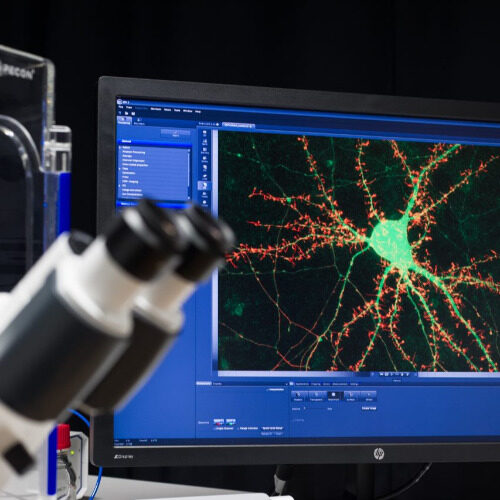
Molecular Genetics of Alzheimer's Disease - Hiltunen Lab
Leaders
Research Goals:
• To identify novel risk gene variants associated with AD and to elucidate their effects on processes relevant for pathogenesis of AD. Risk variant correlations with established biomarker levels in the brain, plasma, and cerebrospinal fluid samples of AD patients are applied.
• To characterize the functional role of AD-related risk genes, pathways, and co-morbidities in AD pathogenesis using in vitro and in vivo disease models. The focus in these models is set to the factors that affect early synaptic dysfunction, function of glial cells as well as ß-amyloid and tau pathology.
Scientific and Societal Impact of Research:
It is expected that the novel mechanistic insights and biomarker potential related to molecular targets, which contribute to the synaptic dysfunction in the early pathogenesis of AD will be discovered. This allows the development of novel intervention approaches aimed at slowing down the progression of AD as well as other neurodegenerative diseases involving similar mechanisms. It is also likely that potential AD-related early biomarker targets will be identified, which can be later evaluated in the early diagnosis and disease progression of AD.
Funding:
Academy of Finland, Sigrid Juselius Foundation, JPND funding, UEF Graduate School of Molecular Medicine, GenomMed-MSCA COFUND, EAKR hankerahoitus, Alzheimer’s Association
Cooperation
-
MGH/Harvard Medical School, USA
-
ISERM, France
-
University of Gothenburg, Sweden
-
Proteome Science Ltd, UK
-
University of Turku, Finland
-
UEF
-
UEF
-
UEF
-
UEF
-
UEF, KYS
-
UEF
-
DZNE, Germany
-
DZNE, Germany
-
University of Helsinki
-
UEF
-
Karolinska Institutet, Sweden
Keywords
Leaders
Senior Researchers
-

Teemu Natunen
University LecturerInstitute of Biomedicine, School of Medicine, Faculty of Health Sciences -
Mari Takalo
Senior ResearcherInstitute of Biomedicine, School of Medicine, Faculty of Health Sciences -

Henna Martiskainen
Senior ResearcherInstitute of Biomedicine, School of Medicine, Faculty of Health Sciences -

Susanna Kemppainen
Project ResearcherInstitute of Biomedicine, School of Medicine, Faculty of Health Sciences -

Petra Mäkinen
BioanalystInstitute of Biomedicine, School of Medicine, Faculty of Health Sciences
Doctoral Researchers
-

Heli Jeskanen
Doctoral ResearcherInstitute of Biomedicine, School of Medicine, Faculty of Health Sciences -
Roosa-Maria Willman
Doctoral ResearcherInstitute of Biomedicine, School of Medicine, Faculty of Health Sciences
Other members
-

Rosa Sinisalo
CoordinatorInstitute of Biomedicine, School of Medicine, Faculty of Health Sciences -
Inka Kervinen
Project ResearcherInstitute of Biomedicine, School of Medicine, Faculty of Health Sciences -
Sini-Pauliina Juopperi
Project ResearcherInstitute of Biomedicine, School of Medicine, Faculty of Health Sciences

